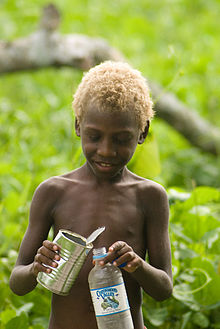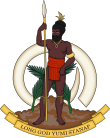Ni-Vanuatu
Appearance
You can help expand this article with text translated from the corresponding article in Croatian. (March 2015) Click [show] for important translation instructions.
|
 | |
| Total population | |
|---|---|
| 245,100 in Vanuatu | |
| Regions with significant populations | |
| Languages | |
| English, French, Melanesian languages | |
| Religion | |
| Christian (Presbyterian, Anglican, Roman Catholic), Animism |
Ni-Vanuatu is a demonym used to refer to all Melanesian ethnicities originating in Vanuatu. It also refers, more generally, to nationals and citizens of Vanuatu, whatever their ethnicity.[1][2][3][4]
This recent coinage builds on the particle ni, which in some indigenous languages encodes the genitive, similar to the English ‘of’. Thus Ni-Vanuatu literally means ‘of Vanuatu’.
The term is mostly used in English and French, and is hardly used in Bislama, the country’s lingua franca,[5] let alone in the indigenous languages of the archipelago.
NiVan is a commonly used abbreviation of Ni-Vanuatu.
See also
References
- ^ "RAMSI Mourns Death of Senior ni-Vanuatu Police Officer". Solomon Times. 28 April 2009. Retrieved August 30, 2011.
- ^ "Ni-Vanuatu arrested NZ", Radio Vanuatu, March 10, 2009
- ^ "Des Ni-Vanuatu en final des Masters", Agence universitaire francophone, July 31, 2008
- ^ "Ni-Vanuatu workers employed under RSE scheme set to increase". Radio New Zealand International. February 18, 2008. Retrieved October 30, 2011.
- ^ Bislama uses more commonly such phrases as man Vanuatu (“V. person” or “V. people”) or blong Vanuatu (“from V.”).

